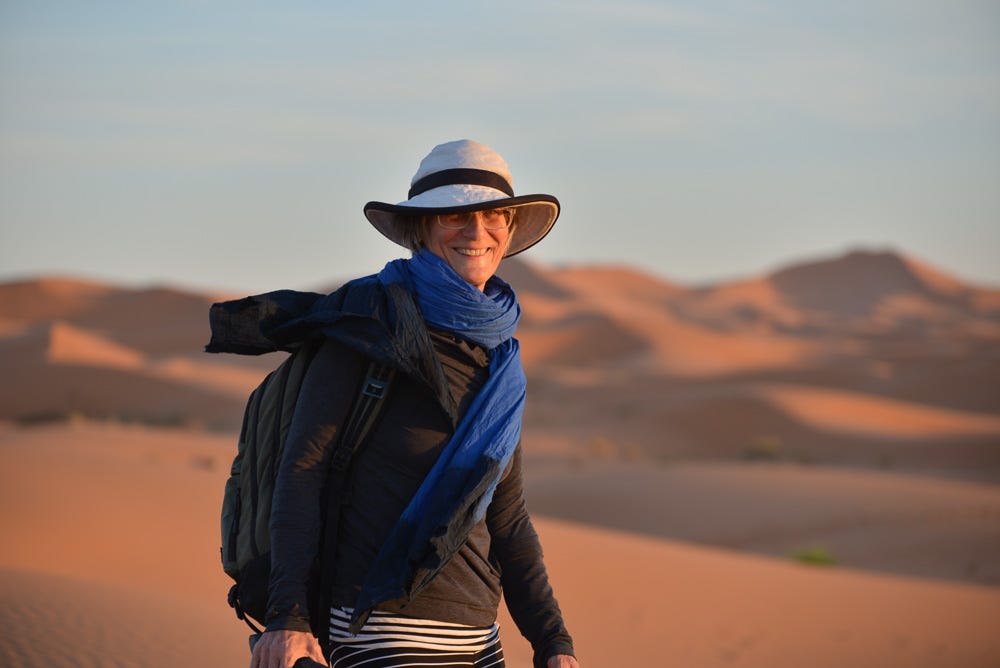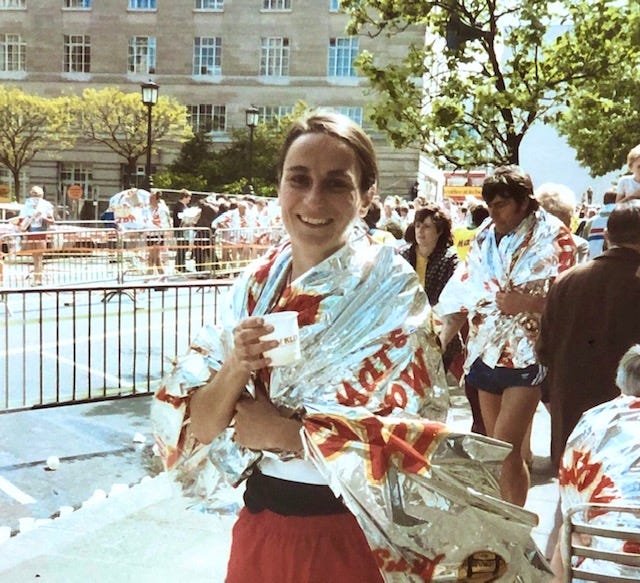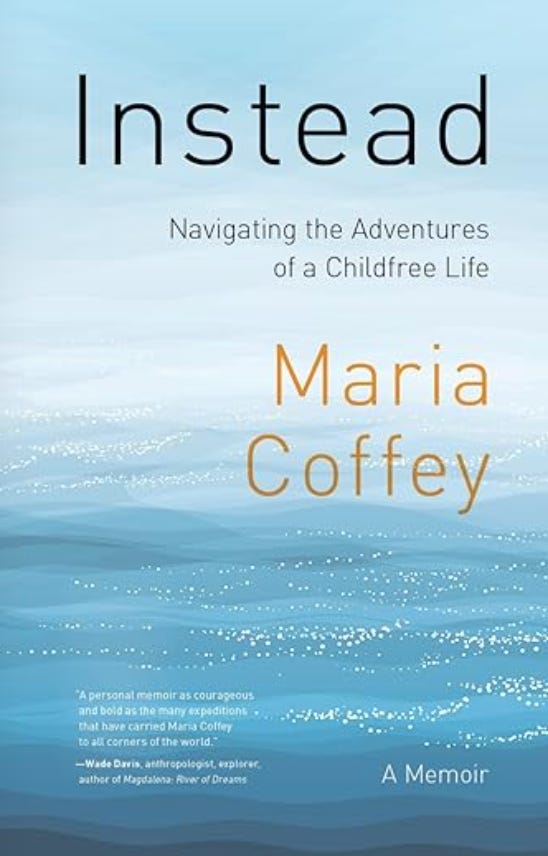No Regrets — Just Some "Counterfactual Curiosity" about Roads Not Taken
An excerpt of Maria Coffey's memoir, "INSTEAD: Navigating the Adventures of a Childfree Life"
This is an excerpt of INSTEAD: Navigating the Adventures of a Childfree Life by 71-year-old Maria Coffey, a memoir about opting for adventure instead of motherhood, and the life-long outcomes of that choice. Instead captures Maria Coffey’s adventurous life through her biggest decisions along the way – including the decision not to have children. It’s a vivid travelogue, a love story, and a personal commentary on the risks and rewards of choosing unconventional paths.
After two traumatic experiences during her 20s — a near-drowning in Morocco and her boyfriend’s death on Mount Everest — Maria determines to seize every day and explore the world. Mixed with her desire for freedom is a new fear of loss, which convinces her against parenthood. She falls in love with Dag, who shares her dreams, and they begin creating a life of adventure. There is one snag: he wants children and thinks they could include them in their wild exploits. Instead follows Maria’s trajectory as she describes her guilt-ridden relationship with her Irish Catholic mother; her baby debates with Dag in unlikely situations, like kayaking through a storm; the doubts that rear up in remote cultures where her childfree choice is unfathomable; and how children eventually – and surprisingly - come into her life.
When I turned 60, I declared myself Age Neutral and announced I was racking up “youth miles.” We had a weekend-long celebration, and several of the guests thought I was joking about which birthday it was. “You do mean 50, don’t you? ” exclaimed one woman, and she wasn’t just being polite.
For some time my husband Dag, five years younger, had been complaining that he was aging for both of us. My genes had been kind to me. This, plus our hectic lifestyle, and without growing children to mark the passage of time, had allowed me to exist in a kind of Neverland: I had simply forgotten I was getting old.
Then things began to quickly change. Deep wrinkles appeared at the sides of my mouth, finer ones around my chin. Flubber crept onto my stomach, crepiness onto my thighs and upper arms. My neck suddenly belonged to a turtle. Comments about how young I looked rapidly dwindled. A specialist I saw about a shoulder issue kept referring to “ladies of your vintage,” as he injected me with cortisone. And, in one way or another, people had started asking about when I was going to retire.
***
We were having dinner with a young couple who were establishing a company to run kayak tours from a remote island in British Columbia. They were interested in how we had set up our adventure travel business, how it had evolved.
“So,” said Dave, as we started on the cheese course. “What’s your exit strategy for Hidden Places? ”
We both gawked at him. “Exit strategy? ” I spluttered.
The truth was we didn’t have one. We’d never had a business plan, or any long-term plans in any area of life. Our modus operandi had always been to first decide what we didn’t want to do. Uncertainty was our stimulus; we embraced it, following our instincts. We had developed trips in areas we wanted to explore, that inspired us, rather than for purely commercial reasons. Creating and running our company had been a big adventure, a haphazard, exciting journey. I didn’t want it to stop.
“I suppose our strategy is — we DIE!” I snapped at Dave, who looked mortified and changed the subject.
“It was a fair question,” said Dag when we were in bed that night. “It’s obvious we can’t keep this pace up indefinitely.”
I stared into the darkness. “I love our big life. I’m terrified of it becoming small. That will come soon enough.”
“What do you mean? ”
“When we’re old.”
“Maria,” he said gently. “You’re almost 64. Next year, you’ll officially be a senior. Life will have to change eventually. You’ve got to be open to that.”
But “eventually” was still a way off. We had recently moved to a loft apartment in downtown Victoria, the capital of British Columbia, which we could rent out while we were travelling. Later that year, in Catalonia, we bought a small village house. It was on a steep, narrow lane with no car access, and, like our Canadian apartment, it had lots of stairs. In the eyes of many, these were poor choices for a couple aged 60 and 65. For us, they were exactly right.
My genes had been kind to me. This, plus our hectic lifestyle, and without growing children to mark the passage of time, had allowed me to exist in a kind of Neverland: I had simply forgotten I was getting old.
Our house in Catalonia proved to be a good jumping off point for work travels in India, Africa, and Southeast Asia. And it was close to our family and friends in other parts of Europe. In the spring of 2018, I flew from Barcelona to London, dropped off my bag at a friend’s place in the Barbican, and walked across the city to Covent Garden for a haircut. The temperature was unseasonably high. Warmth radiated from the stone walls of ancient buildings, sunlight winked against futuristic high-rises. I arrived early for my appointment and sat outside a tiny cafe, sipping an iced latte. I thought about Dag drinking coffee in the sun on the rooftop terrace of our little house. I felt ridiculously happy, for what we had created and done together during our marriage, for the adventures that lay ahead.
“Do you live in London? ” asked the stylist as he examined my hair.
I explained that long ago I’d moved to Canada, and now had a second home in Catalonia.
“I wish I could travel about like that,” he said. “But I’ve got two little kids, so I’m grounded for now. I’ll have to wait until they grow up and I can retire.”
The conversation turned back to my hair. The grey that had invaded its underlayers some years ago was now showing up all over my head. Should I finally consider colouring it?
“Leave it for a while,” he advised. He picked up some lighter strands. “But you do have highlights,” he observed. “Who did them? ”
“The sun and the sea,” I replied, and he laughed out loud.
Dag was bemused to discover I had swung from denying old age to fretting about it. He was affected in all the usual ways by the advance of years, like the shock of looking in the mirror and seeing his father. But he was calmer and more accepting about it.
The cut took longer than I expected, making me late for meeting my nephew Charlie. He lived across London, and he’d been texting me for updates on my ETA. I hurried to the tube station and ran down the escalator to the platform as a train approached. The doors hissed open, I stepped aboard, and a young man sitting next to the opposite glass partition looked at me. He was strongly built and dressed in carpenter’s overalls and boots with reinforced toes. Concern washed across his face; he stood up, indicating I should take his seat. It was unnecessary — the compartment was more than half empty, but out of politeness I accepted his offer. As I sat down, my phone buzzed with an incoming text from Charlie. Quickly, before I lost the signal, I tapped out a reply, telling him I was on my way. It was only when I looked up from the phone that I saw the sign across from me:
PRIORITY SEATING. WOMAN WITH INFANT. PREGNANT WOMAN. DISABLED PERSON. ELDERLY PERSON.
I stared at “ELDERLY PERSON,” and the drawing of a bent-backed figure leaning over a stick under the words. Then I glanced at the kind man in overalls. Our eyes met again. He must have registered my horrified expression because he looked away.
Okay, I told myself, I’m 66, what else did I expect? Very quietly, barely moving my lips so the young man wouldn’t think I was mad as well as old, I spoke the words in rhythm with the rocking of the train: sixty-six, sixty-six, sixty-six. Sibilant – a susurration. I considered how the numbers looked. 66: the rounds like pot-bellies, the forward bends like stooped backs.
Outside the station, Charlie’s familiar form loped toward me. It was over 30 years since his christening, when, as his godmother, I’d stood in a Catholic church denouncing the devil on his behalf. Now he was tall, and strong from workouts and football. We walked along a canal lined with funky houseboats, through a park and to his flat. I was so happy to see him, I forgot about the incident on the train. Later, with his girlfriend, we headed out for dinner. On the way, Charlie told me about having to find quiet restaurants when his father, my brother John, comes to town, because he can’t hear well amid a hubbub. John is three years my senior. We arrived at a Vietnamese restaurant, which Charlie had picked, he said, because he knew I love that cuisine. It was very quiet in there. As we were ordering, a group of 12 women arrived and sat at a nearby table, laughing and talking loudly. Charlie looked concerned.
“Is this place okay, Maria? ” he asked. “Would you prefer somewhere else? ”
Over the years, I’d been to lots of noisy pubs and restaurants with Charlie. This was the first time he’d asked if I minded the din. I remembered the tube train. I saw myself through the eyes of these two young men: an ELDERLY PERSON, her faculties fading.
***
Dag was bemused to discover I had swung from denying old age to fretting about it. He was affected in all the usual ways by the advance of years, like the shock of looking in the mirror and seeing his father. But he was calmer and more accepting about it.
“You were right,” I told him one night. “We can’t keep up this pace forever. But what will happen when we’re really old and frail? ”
“We’ll find out when we get there,” he said. “That’s how it’s always worked for us, right? ”
I wasn’t so sure it would work this time.
Back when Dag had finally agreed with me about not having kids, that seemed done and dusted for us both. So he was puzzled when now I began to wonder aloud if parenthood makes the reality of the last stage of life less daunting. If a grandchild is not just a comfort in old age but also a big distraction.
I remembered a friend from my university days, Ann, who was an artist, a free spirit, a political activist. A few years after we’d graduated, I’d gone to visit her in Wales. She’d told me about her work in the women’s movement and the Anti-Fascist League. While we chatted and drank wine, I noticed the balls of wool and yarn at the end of the table, the needles and knitted squares.
“I’ve been learning how to knit and crochet,” she had explained. “It’s important to have skills like this so you’ll have something to do when you’re old. And it will be good for manual dexterity then. I’m learning piano too.”
I was perplexed. Why start preparing for old age in your 20s? I lost touch with Ann after I moved to Canada, but I heard she’d had twin girls. Now I wondered if, in her 60s, she was using those knitting and crocheting skills. Of course she is, I thought, she’ll be making clothes for her grandchildren. Maybe manual dexterity had only been a small part of her future planning — becoming a mother being a much bigger piece.
***
Back when Dag had finally agreed with me about not having kids, that seemed done and dusted for us both. So he was puzzled when now I began to wonder aloud if parenthood makes the reality of the last stage of life less daunting. If a grandchild is not just a comfort in old age but also a big distraction.
“Well, I guess it’s like seeing a rocket head into the future,” he said. “Another life unfolding, with endless possibilities, with a bit of you attached. So you never really die — or at least you can tell yourself that.”
That didn’t help much. All those warnings during my reproductive years about not having children started looming up again: You’ll regret it. You’ll be lonely when you’re old. At the time, I’d easily sloughed them off. Now I kept thinking about where parenthood might have led us: to be revelling in grandparenthood, like many of our friends, or heartbroken because our child had followed my example and moved to the other side of the world, or —
“Or I’d have long since fled the settled existence you would have wanted for a kid,” said Dag bluntly. “Honestly, Maria, regret is such a waste of time.”
It wasn’t regret. But there were other emotions — and always had been — that I couldn’t find words to describe. The brief, indefinable longing I sometimes felt when I held a newborn baby and breathed in the musky, milky scent of its scalp. The quick stab to my heart when friends proudly showed me photos of their new grandchildren. My moroseness every Christmas, when the decorations, the lights, the presents, the jollity all brought on the sense of being a misfit; the one who hadn’t made her own family.
I chewed this over with a journalist friend. She told me she got pregnant with her first child accidently, at the start of a new relationship. “A burst condom,” she said. “I had thought that was a myth.” She married the father, and they quickly decided to have another baby, then be done with it. Now their sons were in their late 20s.
All those warnings during my reproductive years about not having children started looming up again: You’ll regret it. You’ll be lonely when you’re old. At the time, I’d easily sloughed them off. Now I kept thinking about where parenthood might have led us: to be revelling in grandparenthood, like many of our friends, or heartbroken because our child had followed my example and moved to the other side of the world…
“Before I got pregnant, I was always ambivalent about becoming a mother,” she said. “I sometimes wonder what my life would be like if I hadn’t had kids.”
“So what is that? ” I asked. “It’s not regret. There has to be another word. Or we have to make one up.”
“There’s a term in psychology,” she said. “Counterfactual curiosity. Wondering about ways you could have lived life differently.”
That’s what those feelings were all about. The pangs, the Christmas depressions, the new bouts of fear about the future — they were an awareness of a sister vessel to my life, the one I didn’t board, the route it would be plying now. A parallel me, a Maria who had given birth and raised a child or two. I knew I was a nurturer, that I would have enjoyed motherhood and made my own mother happy. But the life I chose was the life I wanted. If I could go back, my choices would be the same.









"Counterfactual curiosity" is an amazing concept -- reading this piece is a good way to start the day!
Powerful. It is not a frequently spoken truth but those who have children have the same counterfactual curiosity. I wish or I wonder is, i believe, both a gift snd a curse. What could have been. As a society, we allow you to say it aloud but as a parent and especially in some faith cultures, talking about what you missed out on by having children is taboo. But we all think it. Thank you for this.